Are you going through menopause? You're not alone. More than half of all women will go through menopause sometime in their lives. While it's a natural process, it can still be difficult. Menopause brings with it a lot of changes, both physically and emotionally. But there are ways to make the transition easier. One important way is by taking good care of yourself nutritionally and weight-wise. Here are some tips to help you do that.
1. Reduce the risk of cardiovascular disease.
It's important to eat heart-healthy foods, such as fruits and vegetables, while you're going through menopause. So try to fill half your plate with these types of foods at every meal. Also, limit sweets and fatty fried foods.
 2. Watch what you drink.
2. Watch what you drink.
Did you know that drinks containing alcohol, sugar, caffeine or carbonation can make it harder for you to lose weight? They do this in different ways:
Alcohol is high in calories and stops fat from being burned for energy when consumed instead of stored in muscles as glycogen. It also interferes with collagen formation between cells that support muscle, which means muscles will be smaller. In addition, alcohol depresses the central nervous system, causing the brain to send hunger signals even when you aren't really hungry. And it can slow down or lower your exercise tolerance.
Sugar raises insulin levels, which triggers fat storage and makes it harder for muscles to use fat stores for energy.
Caffeine increases cortisol levels in some people, a stress hormone that is associated with weight gain and less muscle mass. When cortisol goes up, testosterone goes down in both men and women. Testosterone is important for building muscle.
Carbonated drinks have been linked with weight gain, especially around the waistline.
 3. Get enough calcium and vitamin D.
3. Get enough calcium and vitamin D.
Calcium is important for strong bones and it may help prevent osteoporosis later in life. So be sure to get plenty of calcium from food sources or supplements – 1,000 milligrams a day after menopause – if your doctor recommends it. But do this only if you're getting enough vitamin D, which is also essential for bone health. Vitamin D helps the body absorb calcium from food sources as well as from supplements. By working together, these two nutrients make it more likely that you'll maintain strong bones now and later in life. Milk is an excellent source of both nutrients, but you can also find vitamin D in egg yolks, fortified milk substitutes and margarine, cheese slices, yogurt and salmon.
 4. Get enough iron.
4. Get enough iron.
Iron is a mineral that's important for healthy blood, which carries oxygen to all parts of your body. Women lose iron during menstruation but need iron from food sources or supplements to compensate for this loss. Iron helps the body store and use energy properly. So if you're anemic (your blood isn't carrying enough oxygen), you'll feel tired and weak, like you need a nap every afternoon or that it's hard for you to exercise. You may even experience hair loss or dry skin. That's why it's important to get enough iron – either through diet or supplements – if your doctor says you are anemic. You especially need to keep eating iron-rich foods after menopause, when the risk for anemia increases as hormone levels change. Lean meat, fish, poultry, dried beans and peas, dark-green vegetables, and iron-fortified cereals are good sources of iron.
 5. Choose healthy fats.
5. Choose healthy fats.
Fat is a big issue for women going through menopause because they often gain weight during this time. But not all fat is bad for you. While it's important to cut back on saturated fats (found in red meat, dairy products, butter, cheese, lard or shortening) and trans fatty acids (in processed snack foods), unsaturated fats can help you lose weight and stay healthy. Unsaturated fats, such as those found in olive oil, avocados, nuts and fatty fish like salmon and tuna, can help keep your heart healthy and protect you from some diseases. But watch how much fat you add when cooking or at the table: Add just enough to cook food without saturating it. And remember that dairy products are also high in saturated fats; choose low-fat or non-fat varieties of milk, yogurt and cheese.
 6. Fill up on fiber.
6. Fill up on fiber.
You may be eating less because more foods don't seem appealing anymore during menopause. So eat plenty of whole grains, fruits, vegetables and beans to make sure you get enough fiber — 25 to 35 grams a day in total after menopause. Fiber is great for your heart, helps you avoid constipation, keeps blood-sugar levels steady, and can help protect against certain cancers.
7. But watch the salt.
Eating too much salt (sodium) can cause fluid retention, which makes it harder for your heart to pump blood through your veins. The added pounds put you at risk for high blood pressure, stroke, and other problems related to cardiovascular disease. So if you're watching your weight, try not to add salt at the table or while cooking because that's where most of us get it. Instead, use spices or no-salt herbs to flavor foods or look into sodium-free seasoning blends made from sea salt or celery. Fresh and dried herbs, lemon juice, garlic and onions are other good sources of flavor without a lot of sodium.
 8. Think about a multivitamin.
8. Think about a multivitamin.
Women going through menopause often have an increased risk for osteoporosis – the loss of bone mass that makes your bones fragile. The later you go through menopause, the less time your body has to absorb calcium from food sources, and the easier it is for you to lose bone density. And if you're taking certain medications or going through severe stress, it's even more important for you to get enough vitamin D and calcium every day – 1,000 milligrams each. If your doctor recommends it, a daily multivitamin can help fill in the gaps and make sure you're getting what you need.
9. Watch what you eat at night
Eating a large meal with lots of fat during the evening can give you too much insulin, which isn't good for your pancreas or weight gain, especially around your middle. If taking in fewer calories during your day makes it hard to get enough nutrients, try splitting them up – have a healthy lunch and small dinner instead of several small meals throughout the day. A bedtime snack of nonfat yogurt and fruit can also be helpful after menopause if you tend to wake up hungry.
10. Move more.
Physical activity is another key part of any weight-control plan, especially after menopause. Not only does it keep you fit and healthy, but also a regular exercise routine helps improve your sex life, the balance of hormones and overall sense of well-being. The more active you are, the less likely you are to gain weight. Walking is an ideal way to burn some extra calories each day. And if time is short, try breaking up your total minutes of activity into three 10-minute blocks a day instead of one 30-minute session or two 15 minute sessions. If either running or jogging is part of your routine, make sure your doctor approves both your fitness level and recent physical exam before going forward with these activities.



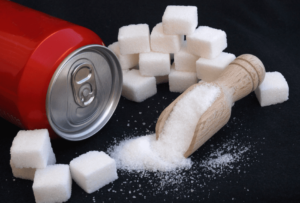 2. Watch what you drink.
2. Watch what you drink.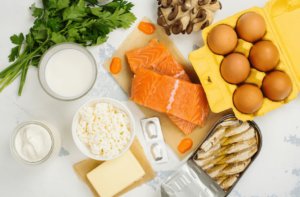 3. Get enough calcium and vitamin D.
3. Get enough calcium and vitamin D.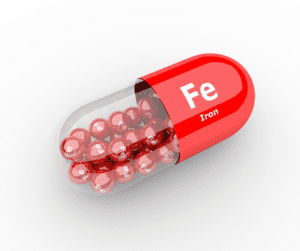 4. Get enough iron.
4. Get enough iron.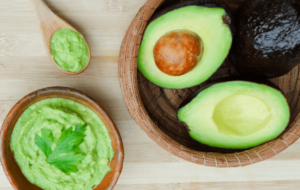 5. Choose healthy fats.
5. Choose healthy fats.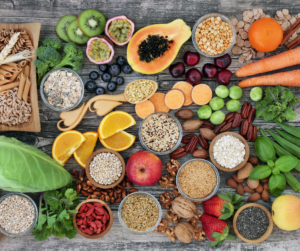 6. Fill up on fiber.
6. Fill up on fiber. 8. Think about a multivitamin.
8. Think about a multivitamin.
Leave a Reply